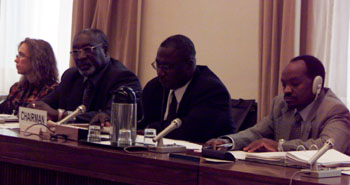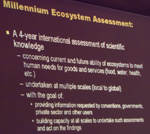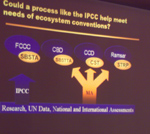|
The
fifth session of the Conference of the Parties (COP) for the Convention to
Combat Desertification Geneva, Switzerland, 1-12 October 2001 |
|||
|
|
||||
|
Traditional Knowledge CST Chair Philbert Brown, Jamaica, introduced the Italian proposal for the realization of a pilot project of a network of institutions, bodies and experts on Traditional Knowledge. ITALY highlighted the proposal, which focuses on the Mediterranean region and builds on ad hoc panel work. It includes cognitive and operational components and involves, inter alia, developing: structures to increasing information on Traditional Knowledge and its application; country inventories and mechanisms; indicators on use and loss of Traditional Knowledge; practical ways of drawing on and legally protecting Traditional Knowledge; a pilot network and an interactive, internet-based data bank. The two-year, US$ 1 million project includes symposia and workshops, training courses and video conferencing to enhance dialogue.
Many delegates highlighted Traditional Knowledge in their countries and initiatives for its gathering, and stressed their interest in being associated with the proposed project. Participants stressed merging Traditional Knowledge with contemporary knowledge and techniques. CANADA stressed inclusion of holders of oral knowledge. GERMANY and IRAN proposed links to existing initiatives
Review of National Reports Help Guide: The Secretariat presented its proposed revisions to the guide, consisting of new remarks, questions and evaluation parameters. Delegates differed in opinion regarding the desired specificity of the guidelines
Early Warning Systems: The Secretariat outlined the history, mandate and key concerns relating to Early Warning Systems (EWSs) and Dr. Kazuhiko Takeuchi (Japan), chair of the ad hoc panel to examine EWS, presented the findings of the panel at its meeting in June 2001 in Yamanashi, Japan
Strategies for the Communication of Information and Its Use to Generate Best Practices for Combating Desertification: The Secretariat presented the two "different but complementary" submissions on this topic by Canada and the OSS. Remarks by the OSS drew attention to weaknesses in the mechanisms of communication, including the format of information and lack of infrastructure in developing countries
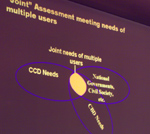
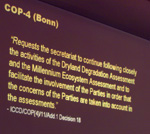
Dryland Degradation Assessment and the Millennium Ecosystem Assessment: The Secretariat introduced the document on the Land Degradation Assessment in Drylands (LADA) and Millennium Ecosystem Assessment (MA) initiatives.
Anna Tengberg (UNEP) presented on the status of the LADA – which aims to provide basic standardized information and methodological tools for land degradation assessment at different geographic scales, including assessment of hotspots and bright spots at the national level – noting it is now in its second planning phase and has entered the GEF pipeline. In response to questions from the floor, she said methodologies are still being developed, and a consultative approach will be taken
|
|
|
| © 2001, Earth Negotiations Bulletin. All rights reserved. |
|


